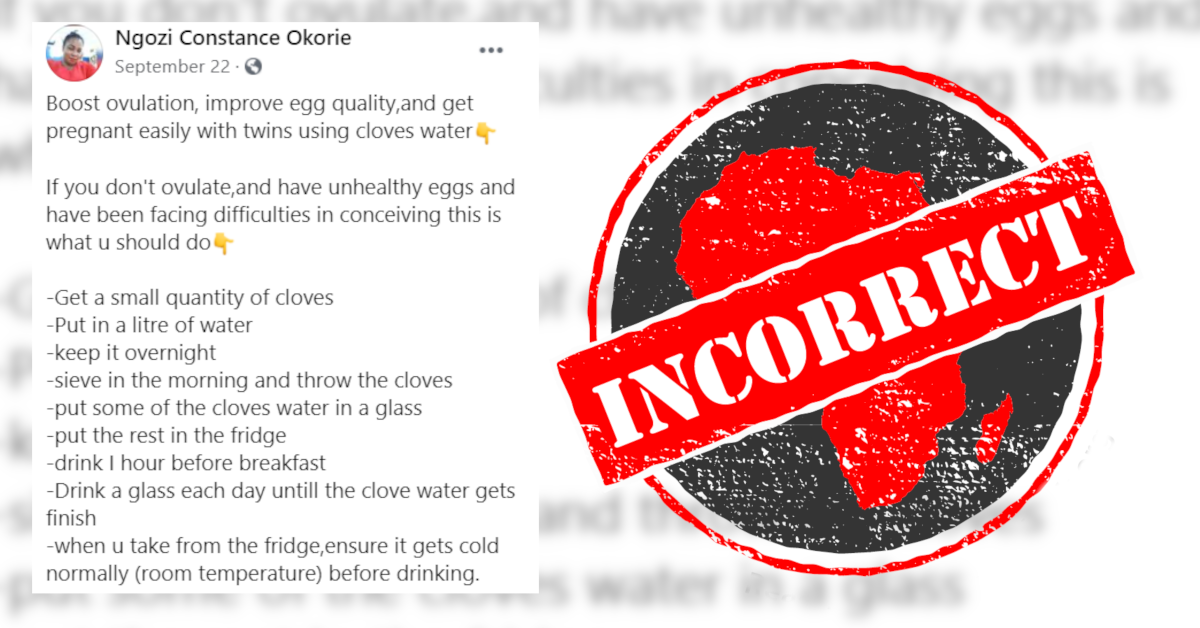A Facebook post shared in Kenya and Nigeria advertises a remedy it claims will help women who “don't ovulate, and have unhealthy eggs and have been facing difficulties in conceiving”.
It advises women to drink a mixture of the clove spice and water. A certain quantity of the spice – readers are told to “inbox” the poster to find out exactly how much – is infused in one litre of water, to be drunk one hour before breakfast “untill the clove water gets finish”.
Cloves, the dried flower buds of the clove plant, have been used in folk medicine across many cultures, particularly to treat oral diseases or dental complaints. But is there any evidence the spice could be a remedy for infertility? We checked.
According to the World Health Organization, infertility is a disease of the reproductive system defined as “the failure to achieve a clinical pregnancy after 12 months or more of regular, unprotected sexual intercourse”.
The US-based National Institute of Child Health and Human Development says common causes of infertility in women include structural problems in the reproductive system, failure of an egg to mature properly, endometriosis and polycystic ovary syndrome.
Africa Check asked Dr Nelly Bosire about the claim. She is an obstetrician and gynaecologist who chairs the advisory board of St Francis Community Hospital in Nairobi, Kenya, and previously served on the board of the Kenya Medical Practitioners and Dentists Council.
“I have looked through all the medical evidence regarding cloves and fertility and I have not found any published data to support this,” Bosire said.
She advised people with fertility issues to seek professional advice rather than using unproven remedies.
“Any one facing challenges with their fertility should see a fertility specialist for a proper diagnosis and treatment,” she said.
We also contacted Dr Gichuhi Joseph Wanyoike, an obstetrician and gynaecologist who works at the department of obstetric and gynaecology at Kenyatta National Hospital in Nairobi.
“There is no evidence whatsoever that cloves can improve your fertility or ovulation. Any woman struggling with infertility should see a gynaecologist so she can be advised appropriately,” he said.
“Sometimes the problem is not even ovulation, but something else, like the man’s sperm.” – Dancan Bwire
It advises women to drink a mixture of the clove spice and water. A certain quantity of the spice – readers are told to “inbox” the poster to find out exactly how much – is infused in one litre of water, to be drunk one hour before breakfast “untill the clove water gets finish”.
Cloves, the dried flower buds of the clove plant, have been used in folk medicine across many cultures, particularly to treat oral diseases or dental complaints. But is there any evidence the spice could be a remedy for infertility? We checked.

Many causes of infertility
According to the World Health Organization, infertility is a disease of the reproductive system defined as “the failure to achieve a clinical pregnancy after 12 months or more of regular, unprotected sexual intercourse”.
The US-based National Institute of Child Health and Human Development says common causes of infertility in women include structural problems in the reproductive system, failure of an egg to mature properly, endometriosis and polycystic ovary syndrome.
Africa Check asked Dr Nelly Bosire about the claim. She is an obstetrician and gynaecologist who chairs the advisory board of St Francis Community Hospital in Nairobi, Kenya, and previously served on the board of the Kenya Medical Practitioners and Dentists Council.
“I have looked through all the medical evidence regarding cloves and fertility and I have not found any published data to support this,” Bosire said.
She advised people with fertility issues to seek professional advice rather than using unproven remedies.
“Any one facing challenges with their fertility should see a fertility specialist for a proper diagnosis and treatment,” she said.
We also contacted Dr Gichuhi Joseph Wanyoike, an obstetrician and gynaecologist who works at the department of obstetric and gynaecology at Kenyatta National Hospital in Nairobi.
“There is no evidence whatsoever that cloves can improve your fertility or ovulation. Any woman struggling with infertility should see a gynaecologist so she can be advised appropriately,” he said.
“Sometimes the problem is not even ovulation, but something else, like the man’s sperm.” – Dancan Bwire
Republish our content for free
For publishers: what to do if your post is rated false
A fact-checker has rated your Facebook or Instagram post as “false”, “altered”, “partly false” or “missing context”. This could have serious consequences. What do you do?
Click on our guide for the steps you should follow.
Publishers guideAfrica Check teams up with Facebook
Africa Check is a partner in Meta's third-party fact-checking programme to help stop the spread of false information on social media.
The content we rate as “false” will be downgraded on Facebook and Instagram. This means fewer people will see it.
You can also help identify false information on Facebook. This guide explains how.


Add new comment